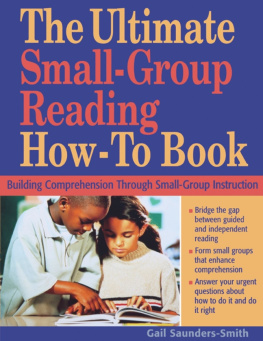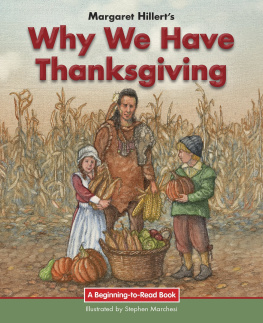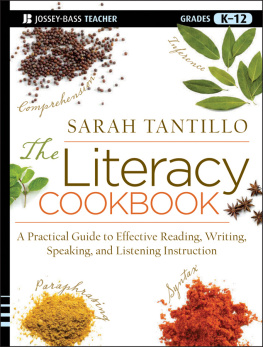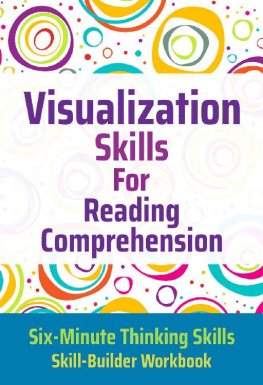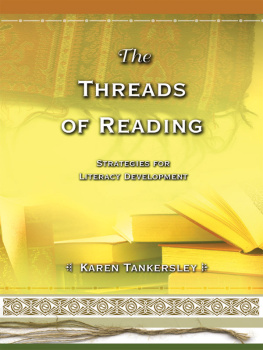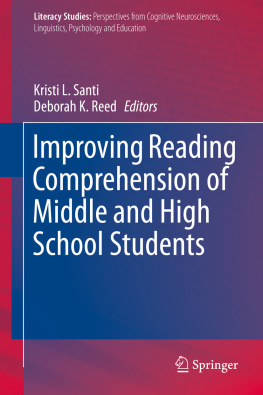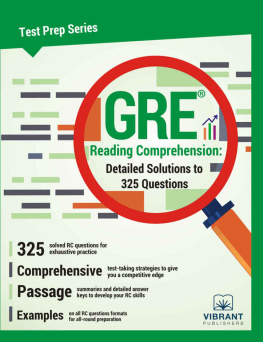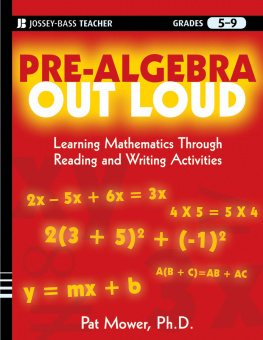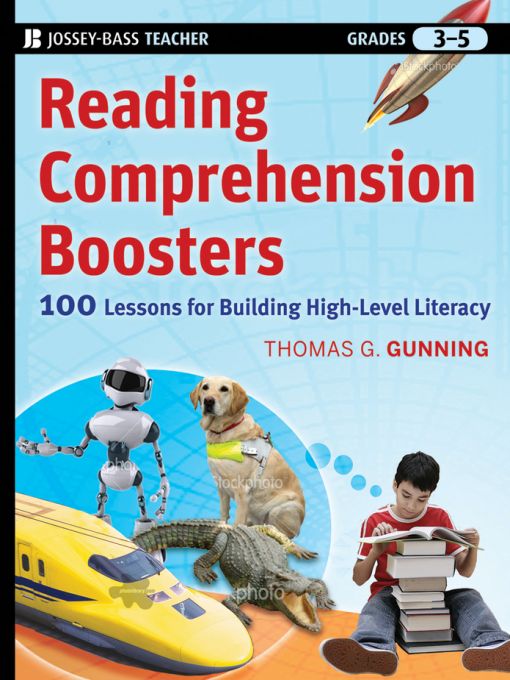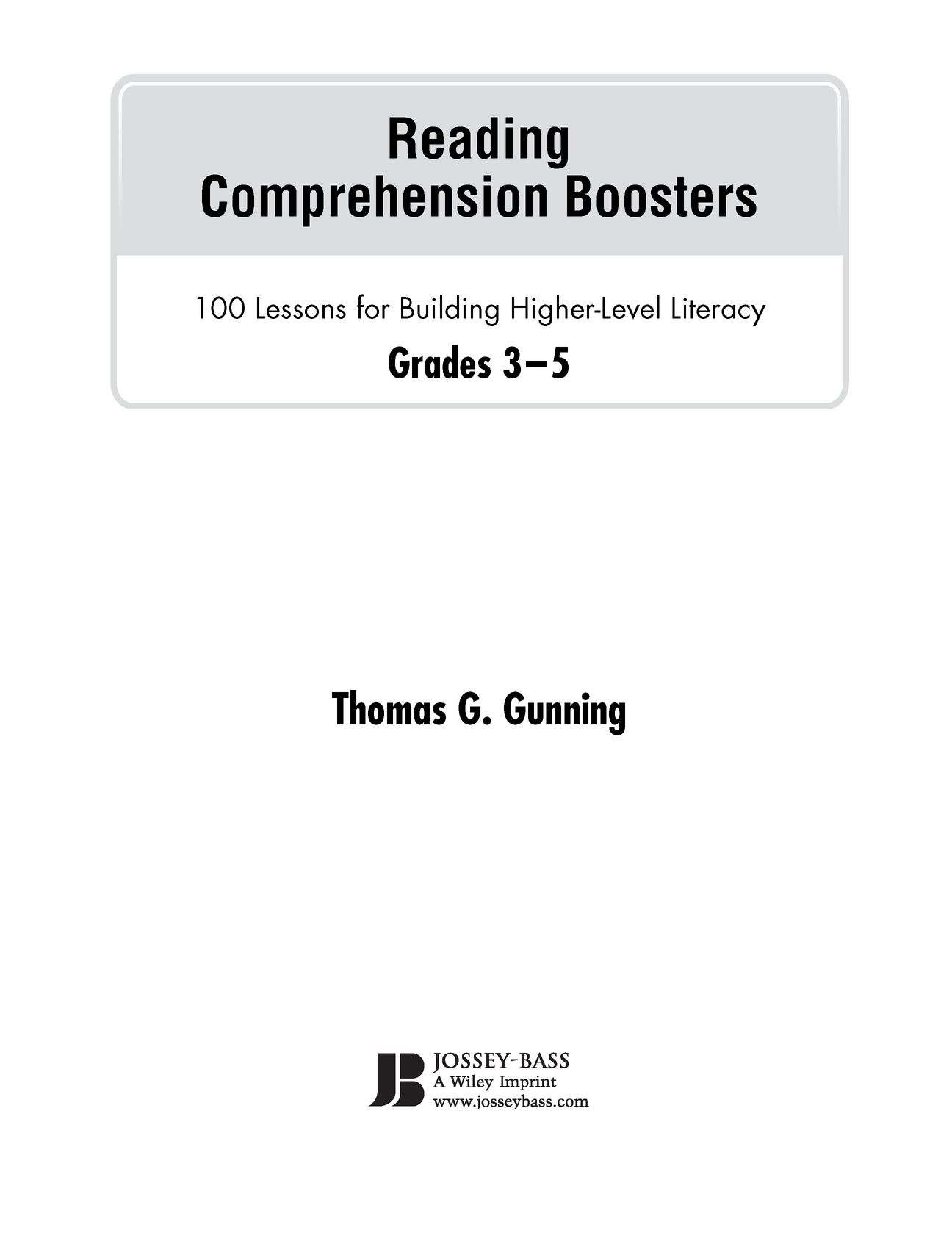Table of Contents
Jossey-Bass Teacher
Jossey-Bass Teacher provides educators with practical knowledge and tools to create a positive and lifelong impact on student learning. We offer classroom-tested and research-based teaching resources for a variety of grade levels and subject areas. Whether you are an aspiring, new, or veteran teacher, we want to help you make every teaching day your best.
From ready-to-use classroom activities to the latest teaching framework, our value-packed books provide insightful, practical, and comprehensive materials on the topics that matter most to K-12 teachers. We hope to become your trusted source for the best ideas from the most experienced and respected experts in the field.
About This Book
Reading Comprehension Boosters: 100 Lessons for Building Higher-Level Literacy, Grades 3-5 is a program designed to help your students acquire the higher-level reading, reasoning, and responding skills they need to cope with complex literacy demands, including high-stakes tests. The program consists of the following key components:
An overview of the program. The Introduction provides a rationale for the program and describes its scope and sequence.
Motivational introduction to the program. Mystery Passages are used to motivate students by having them engage in riddle-type tasks that also provide diagnostic information and lay the groundwork for upcoming units.
100 lessons. The core of the book is the series of 100 lessons designed to introduce and reinforce key skills and strategies for literacy. Each lesson begins with a teaching guide that provides suggestions for introducing the skill or strategy and supplying guided and independent practice. Many lessons also contain suggested extension and assessment activities. Following the teaching guide are the Student Pages, which contain practice materials so that students can apply the strategies and skills that they have been taught. The Student Pages feature high-interest theme-related reading selections accompanied by questions and other activities designed to reinforce the skills and strategies that have been introduced.
An end-of-theme reflection for the teacher that offers concrete suggestions for applying the strategies taught in the unit to whole books. This section also includes a bibliography of books relevant to the theme of the unit.
A culminating reflection for students in which they think back on what they learned and how they can apply these new strategies and skills to school texts and outside reading. Also included is a list of books where they can find more information about the theme of the unit.
About the Author
Tom Gunning is professor emeritus at Southern Connecticut State University, where he was department chairperson and director of the Reading Clinic. He is currently an adjunct professor in the Reading/Language Arts Department at Central Connecticut State University, where he teaches courses in assessment and intervention. He has been a secondary school English teacher, a secondary school reading specialist, and an elementary school reading consultant. He was also the editor of Know Your World Extra, a periodical for struggling readers.
Gunning has been a consultant for elementary schools in areas that include improving the core curriculum, implementing response to intervention, and planning programs for severely disabled readers. Trained as a Junior Great Books discussion leader, he has used this approach with students in an urban elementary school. Recently he served as a hands-on consultant for a Reading First school.
Gunning is the author of Creating Literacy Instruction for All Children (7th edition); Assessing and Correcting Reading and Writing Difficulties (4th edition); Developing Higher-Level Literacy in All Students; Closing the Literacy Gap; and Word Building, a Response to Intervention Program, designed for students with decoding problems. He is also the author of a number of childrens books, including Strange Mysteries, Amazing Escapes, and Dream Cars. He is the coeditor with Jim Collins of Building Struggling Readers Higher-Level Literacy: Practical Ideas, Powerful Solutions.
Gunning was a contributing editor for My Friend, a nonprofit magazine for students in grades 1 to 8, and was a member of Sports Illustrated for Kids panel of experts to advise the editorial staff on the readability and suitability of this magazines articles. He is a past president of the Readability Special Interest Group and is currently the groups membership chairperson.
Gunning has conducted research on group reading inventories, severe reading disabilities, intervention programs, readability, response to intervention, decoding processes and strategies, and literacy skills needed to cope with high-stakes tests.
Gunning has a bachelors and a masters degree from Loyola University Maryland and earned a doctorate in the psychology of reading from Temple University in Philadelphia. As a Mellon Visiting Fellow at Yale University, he studied brain development and its implications for literacy instruction.
The impetus for Reading Comprehension Boosters: 100 Lessons for Building Higher-Level Literacy for Grades 3-5 grew out of his lifelong work with struggling readers, recent work with struggling comprehenders in a Reading First school, and current work with students who are proficient decoders but poor comprehenders.
Introduction
Reading Comprehension Boosters: 100 Lessons for Building Higher-Level Literacy, Grades 3-5 takes a step-by-step approach. Key prerequisite skills are taught in each of the six units. Instruction is heavily scaffolded at first, but students are gradually led to independence. For deriving main ideas, for instance, students are taught to categorize, a key prerequisite skill. Students also select from possible main ideas in a multiple-choice format before constructing their own.
Because comprehension is a constructive process in which students create meaning based on their background knowledge, Reading Comprehension Boosters has been designed to build background knowledge. Topics are developed in depth so that students background knowledge and ability to make generalizations are enriched. A theme approach has been taken because this allows for determining relative importance of information, comparing and contrasting, noticing similarities and differences, and drawing conclusions, all of them key thinking skills. Because vocabulary is a key component of comprehension, vocabulary is systematically developed. Once students have become familiar with the program, they are introduced to two vocabulary words in each lesson.
Because higher-level comprehension demands engagement, high-interest topics are featured. Students will read about such intriguing topics as guide horses, two-headed snakes, parachutes for planes, flying cars, children who help make the world a better place, and sleep patterns in people and animals.
Although Reading Comprehension Boosters features intriguing topics, its main function is to introduce students to key higher-level literacy strategies. It is essential that students then apply these skills to their content-area texts and trade books. Reading Comprehension Boosters


